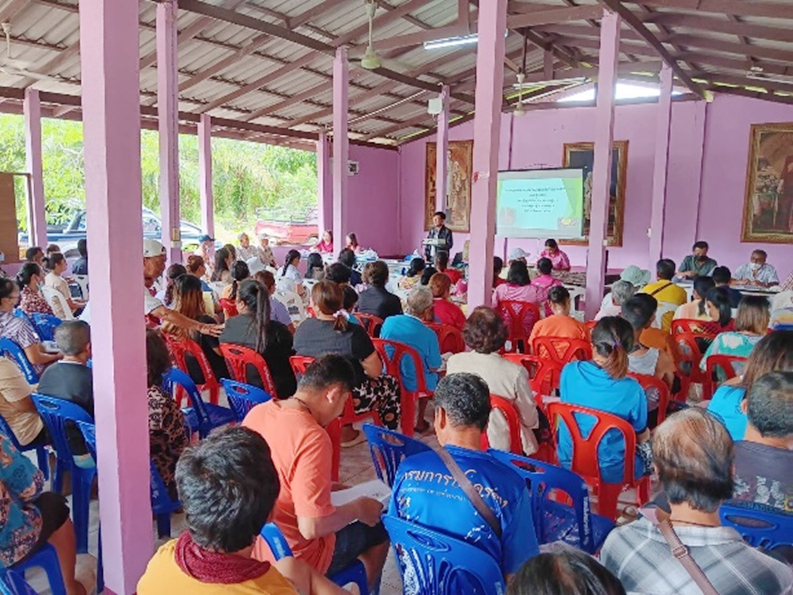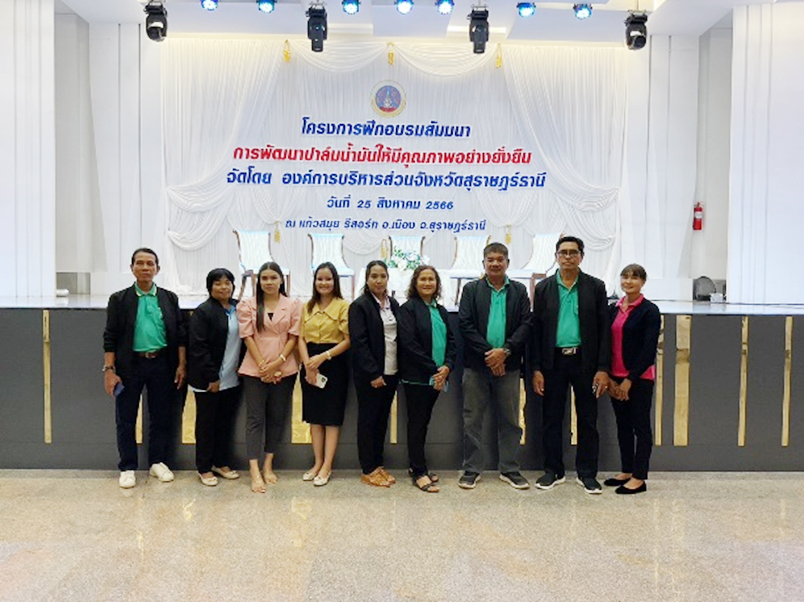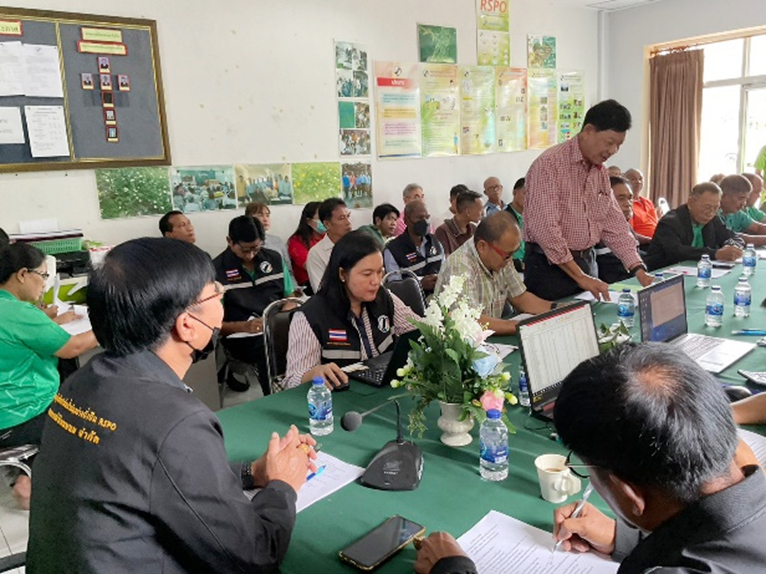
About the group
Number of smallholders: 1211 (1002 Men, 209 Women)
Total Land Area: 3574.06 Ha
Status: Certified
Group location: 308 Village No. 1, Phanom Subdistrict, Phanom District, Surat Thani Province 84250
Country: Thailand
On-going Facilitator: Prince of Songkla University - Surat Thani Campus
SUSTAINABILITY JOURNEY STORY
| “Farmers have expectations that forming a Community Enterprise or Cooperative group will create bargaining power on prices”
…………………………………….
Mr Tawach Lahsakul, the manager of Phanom Land Settlement Cooperatives Limited in the Phanom district, Surat Thani province, reported, “The majority of areas in the Phanom district are located in complex mountainous terrain. There is a small area of foothill slopes resembling waves that is suitable for growing economic crops. This area is classified as highly (S1) or moderately (S2) suitable for palm plantations.
Currently, the Phanom district boasts 5,020 households of oil palm growers. The total plantation area is 93,560 rai, out of which 88,010 rai is dedicated to harvest. The average oil palm productivity is 2,500 kg/rai. There are 20 oil palm bunch collection centres to trade oil palms and one palm oil extraction mill.
As for large oil palm plots, Phanom Land Settlement Cooperatives Ltd. originally formed a settlement cooperative group supervised by Phanom Settlement Cooperative, Surat Thani Provincial Cooperative Office, Department of Cooperative Promotion. The group had its own management structure, which carried out various activities through group and cooperative steering committees. The group had an action plan and implemented the plan, as well as regularly monitored and reviewed activities.
Until 2016, Phanom Land Settlement Cooperative Limited acknowledged the importance and adhered to the Ministry of Agriculture and Cooperatives’ strategy to establish large-scale plots and launch an oil palm production project in accordance with RSPO standards. The project aims to optimise the production structure to improve the efficiency of integrated production in the palm oil market. Our present status is that of being RSPO accredited.
The Manager of the RSPO-certified Phanom Land Settlement Cooperative Limited further added that members currently grow oil palm instead of rubber plantations or fruits, which were previously cultivated by farmers. As a result, the plantation area for each member averages no more than 15 rai.
Regarding the traditional method of farming practised for many years, farmers initially did not grow other crops on palm farms. However, they have started intercropping with crops such as cocoa, which is increasingly in demand, and Gnemon vegetable, which is perceived as chemical-free and easy to grow. Intercropping reduces household expenses and also yields products for personal consumption or sharing with neighbours.
In addition, cocoa crops take 3-4 years to reach harvest maturity. Most of the yield comes from the Tha Chang and Vibhavadee groups, who have planted on numerous plots and established markets for their products. When converting new plots, farmers replaced rubber trees with oil palms; however, they could not harvest immediately. To earn income during this period, farmers intercropped with maize within the palm farms.
Regarding the group’s perspective on sustainable oil palm plantations, the manager of the RSPO Phanom Land Settlement Cooperative Limited stated that members have shifted to oil palms because they represent a stable crop that can provide consistent income for their families. The crop is sustainable in terms of both price and yield, starting from the time of planting and continuing for up to three years.
“Members believe growing palm oil is the top occupation because of the frequent rain in the south. This weather condition limits the tapping of rubber, and rubber prices have remained stagnant for the last 4-5 years. Additionally, rubber cultivation encounters disease and fungal issues, preventing consistent latex production. Therefore, rubber growers have shifted towards oil palm plantations,” said Tawach.
“Furthermore, as older generations of farmers age, they believe that growing palm allows them to realise income faster. Specifically, after 36 months, they can harvest palm yields, while a rubber plantation requires nine years. In addition, there are markets interested in buying palm products. Also, oil palm bunch collection centres are located in the community, the subdistrict, and the district, providing future generations of farmers opportunities to cultivate palm. Social media provides knowledge on how to increase productivity per rai of palm crops. Farmers are shifting toward growing more palm, perceiving it as an economic crop that generates more income.”
Speaking about potential future challenges the group may face, Tawach stated, “The primary concern lies in the uncertainties surrounding the global economic climate and Thai politics. On the market side, there are few obstacles because palm is a popular crop widely used in food preparation.
Regarding group management, Tawach explained, “Since most members shifted from rubber to oil palm cultivation, they understand farming practices well. Moreover, younger farmers with better education and knowledge of modern practices find it easier to manage plantations. In the past, older palm growers bought and planted palm varieties with little knowledge from either government agencies or the media. At present, there is so much informative media available that young farmers find it much easier to operate palm plantations.”
Asked to explain farmer expectations after joining the RSPO sustainable plantation system, Tawach suggested, “Farmers expect that by creating a group in the form of a community enterprise or cooperatives, they will have more negotiation power when bargaining over prices.”
Regarding the average productivity of current members, the manager of Phanom Land Settlement Cooperative Limited reported, “Before applying the standard, the average productivity was 2.5 tonnes/rai/year. After forming the group to consistently improve palm quality, the present yield has increased to 3.3 tonnes/rai/ year.”
Asked what kind of support is needed to accomplish the projects for smallholders, Tawach said, “They need to refresh their knowledge through training. Secondly, they would like to develop additional palm products, such as processing palm fronds into animal feed.”
Tawach added, “Five to six years ago, the group lacked an adequate learning centre. As a result, the organisation needed to establish a dedicated learning centre where outsiders or people from other provinces could learn about palm plantation practices and processing methods and where they could observe demonstration plots. The group now has land available, but it needs funding of approximately 4-5 million Thai baht to construct the building and hire a permanent staff person at the centre.”
“Should we receive additional funds, they will be divided into two parts. The first part is for fundamental operations, which include assessing initial conditions, enhancing farmers’ capabilities, evaluating social and environmental impact, carrying out HCV assessments, conducting inspections for certification, creating maps, and addressing other related issues. The second part is allocated to establishing a learning centre and developing nursery plots for plant sales to members. At present, our members depend on sourcing palm varieties from other areas. Establishing a learning center and selling palm seeds directly to members will prove advantageous as it cuts costs and reduces production expenses.”
|
Project Impact
Total area covered by the project
3574.06 Ha
Number of smallholders benefitting from this project
1211 Smallholders
Number/percentage of women supported by this project
17.26% women in this project
How you can support
| 1. Refresh knowledge through structured training programmes.
2. Develop additional by-products, such as processing palm fronds into animal feed |
GROUP CONTACT
Representative Contact
Tawat Laskul | Manager | [email protected] | (+66) 77 399 088
Piyarat Rakkapao
Database Staff
(+66) 62 389 3754
[email protected]
FACILITATOR GROUP CONTACT
Representative Contact
Asst. Prof. Dr. Benjamaporn Pimpa | Assistant Professor +66 61 192 4299 | [email protected] |
IMAGE GALLERY

Phanom Land Settlement Cooperative Limited

Phanom Land Settlement Cooperative Limited

Phanom Land Settlement Cooperative Limited

Phanom Land Settlement Cooperative Limited




